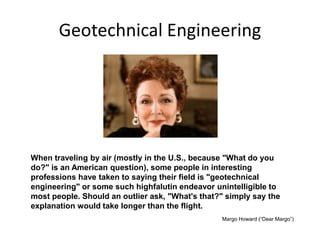A Biased View of Geotheta
The 9-Minute Rule for Geotheta
Table of ContentsGeotheta Things To Know Before You Get ThisThe Buzz on GeothetaThe Geotheta PDFsWhat Does Geotheta Do?
They collaborate with civil designers, structural designers, architects, and various other professionals to integrate geotechnical factors to consider right into the general project design and building and construction procedure. This needs efficient teamwork, coordination, and communication to make sure that the geotechnical facets straighten with the job purposes and fulfill governing demands.Mining & Materials Design: Principles of boring, infiltration prices, and factors affecting the option of drilling approach. Blowing up methods in surface and underground operations. Mechanical and continual approaches to fragmentation, including longwall shearing and fullface boring.
Modelling of fragment and bit size distributions; comminution as a transfer feature. Comminution modern technology: squashing, grinding, dimension category. Integrated evaluation of fragmentation and comminution procedures. Supplied by: Mining & Products Design.
An Unbiased View of Geotheta
Bachelor's level programs in civil, geotechnical, geological, and ecological design usually last 4 years and consist of basic education courses in English, social science, and the liberal arts, in addition to courses in sophisticated mathematics, architectural geology, and liquid mineralogy. (https://trello.com/u/geotheta)
Geotechnical design involves the analysis of the dirt and rock conditions at a particular website, and their effects for the development of that site. As most structures rely upon the ground for support, it lacks shock that a detailed understanding of the ground conditions, and the suitability of foundation systems, are vital to the long-lasting stability and performance of the building or structure.
Specialising in the investigation of geological developments and ground behavior, geotechnical designers perform clinical investigations and testing to recognize the influence these geological developments might have on the style and building and construction of structure, civil and facilities projects. This expertise is critical for the design and building of structures, roads, passages, dams, bridges, and supply of water and sewer systems.
The geotechnical group at Douglas Allies consistently seek advice from with engineers, design engineers, developers, and building contractors to make referrals on layout and development propositions to make certain that the constructed frameworks are accordingly developed for the ground conditions. For example, the style of footing systems needs to take into consideration the weight of the structure, the capacity of the ground to sustain that weight with each other with motion tolerances and reliable construction.
Geotheta Fundamentals Explained
This task is substantially simplified by the use our Douglas Map geospatial system which makes this details conveniently obtainable in a very easy to utilize internet internet browser interface. A geotechnical engineer will certainly route the drilling of boreholes and test pits to collect soil and other samples, and also examine surface attributes and ground direct exposures to form a geotechnical model of the subsurface conditions.
Depending upon the job type and ground problems encountered, laboratory testing may among other points evaluate stamina, compressibility, reactivity and/or permeability of soil and rock samples. Hereafter data is gathered and looked at, the outcomes are used for a geotechnical version of the website, which is generally offered as areas throughout the website.

A geotechnical investigation naturally can only assess the ground conditions at the places drilled or dug deep into. Natural variants in dirt and rock conditions can take place throughout a site and between examination locations. It is as a result good practice that the geotechnical engineer be preserved throughout construction of the job to offer on-site confirmation that the ground problems encountered are consistent with the expectations and guidance offered in the geotechnical investigation report.
Geotheta Things To Know Before You Buy
Geotechnical engineers utilize their extensive knowledge of dirt and rock to analyze danger and fix troubles on diverse infrastructure projectsGeotechnical design is a specialist branch of civil engineering which looks at the behavior of earth products and the application of dirt and rock auto mechanics. Consulting Engineer. As a geotechnical engineer, you will analyze the physical, mechanical and chemical residential properties of dirt and rock in order to design foundations, keeping frameworks and earthworks
Geotechnical engineering is closely linked to and overlaps with, both engineering geology and ground engineering - https://my-store-fc66c1.creator-spring.com/. It's feasible to specialise in geotechnics or help a geotechnical business but be referred to as an engineering rock hound or a ground engineer. As a geotechnical engineer, you'll require to: build and keep partnerships with customers and other specialists involved in the website, throughout each projectmaintain safety criteria on website bear in mind price ramifications when you make recommendationsstudy geological maps and airborne photographs from a variety of resources and from various time periodsexamine building and construction plans to see just how practical they are based on your understanding of the siteinvestigate risks or geological hazards for the sitesearch for ecologically sensitive attributes, such as garbage dump beginning to create factual and interpretive ground modelsplan field investigationsdrill and evaluate samples of bedrock, soil, groundwater and added products supervise other experts on sitesolve technological issues as they emerge, such as unexpected structures at drill sitesmonitor conditions throughout and after building to make certain frameworks are steady in the brief and long termadding data collected on site to your initial researchcreating geotechnical estimations, drawings, and two or three-dimensional computer system versions analyzing the datamaking recommendations concerning the suggested use the website
